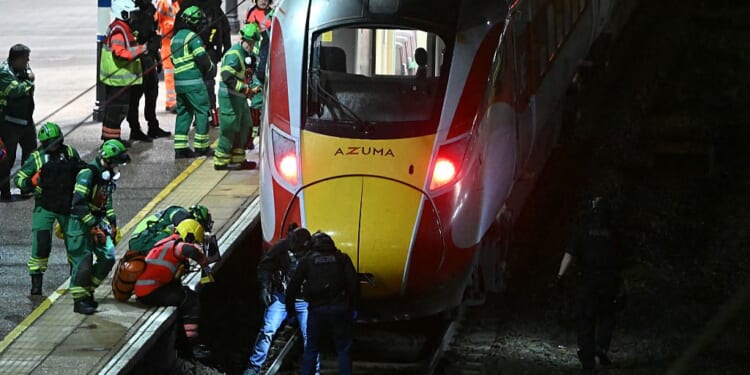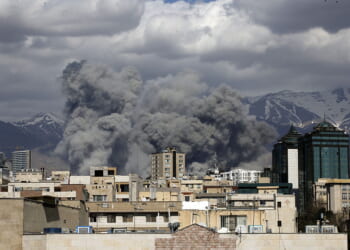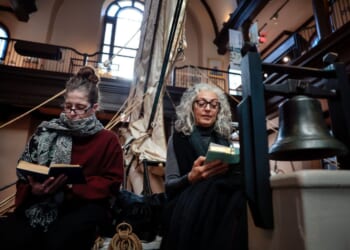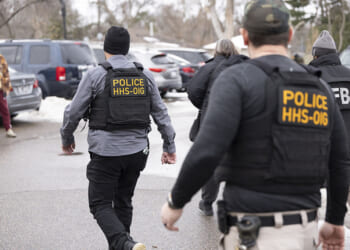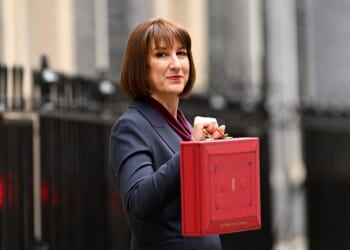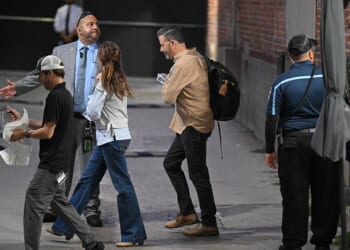For all the unfathomable violence of the Huntingdon knife attack, officers know it could have been worse — much worse. Luckily, as with last week’s Uxbridge stabbing, the police response was timely and effective. Within eight minutes of the first 999 call, armed officers were on the station platform, tasering what now appears to be the only suspect. The British Transport Police (BTP) were also quick to reveal the man as a black British national in his 30s, and reported an apparent lack of terrorist motives. In all this, officers have learned from the botched media operations that followed last year’s Southport murders.
Now, though, detectives now face the political and procedural struggles of a high-profile criminal investigation. Hints of this came early, as Defence Secretary John Healey patrolled the Sunday morning news shows, offering lawyerly answers to questions around crime and extremism. Behind the scenes, however, the Government will be wary. The public mood is febrile, and all this before a strategy on “the way forward” is even announced. Leading the inquiry are the 5,000-strong BTP, responsible for investigating all offences committed on Britain’s mainland railway network.
They are sometimes criticised for slow response times — other forces joke that “BTP” stands for “Be There Presently” — and this is the likeliest reason that the arresting officers came from Cambridgeshire Police. Yet BTP is genuinely stretched, a truly national force responsible for the railways from John o’Groat’s to Land’s End. Furthermore, many of its specialist resources are focused on major termini, leaving smaller stations relatively unpoliced. Even so, BTP has strengths. Its officers, for instance, are specially trained in evidence-gathering on the railways. Railway infrastructure is a surprisingly complex and occasionally dangerous environment for investigators. Evidence, for example, might end up on live railway tracks. It goes without saying, here, that closing a line to facilitate police work is far from simple, especially a major East Coast route like this one.
BTP has concluded there is currently no evidence of terrorism. How and why? The answer lies in both the circumstances of the offence and a fast-time intelligence response, in this case aided by police Counter Terrorism Units. Presumably the suspect didn’t featured on any Security Service or criminal-intelligence databases. The suspect’s home, once identified, will have been searched, and his electronic devices checked. Officers will also have investigated his associates, vehicles, financial records and any criminal history. They will further have sought an urgent interview with the suspect himself, possibly even before the arrival of his legal representatives. We can only speculate what information police gleaned beyond “no comment”.
Does this, then, establish irrefutable evidence there was no terrorist angle to the stabbings? Not completely. All the same, I would suggest the BTP’s assessment was made in good faith. After all, someone very senior put their name to such a conclusion. And given trust in the police and government is already frayed, a bad judgement on such a serious matter would be disastrous. Given the number of scandals around governmental candour, and the Prime Minister’s dire personal polling, this investigation will only get bigger — or “grow arms and legs” as officers say.
This still leaves the thorny question of motive. Social media provides, as ever, a vortex of misinformation, speculation: and outright fantasy. Investigators, on the other hand, will focus on the facts. Once terrorism and extremism are discounted, few alternatives remain. Was this a mental health incident? Now that we know there’s only one suspect — a second man was arrested before being released without charge — that’s the most likely explanation: especially as the alleged assailant apparently ranted about the devil, and asked to be killed as the police approached. Whatever the truth, and as with all such crimes, the details offer hearty meat and drink to conspiracy theorists. To counter them, police will need to tread a fine line between offering fact-based public assurances while protecting the integrity of court proceedings.
In all this, senior officers are crucial. Lucy D’Orsi, the BTP’s chief constable, was extremely ambitious while working at the Met. She may still covet the Commissioner’s job and will certainly understand the pressure to be seen to “do something”. This highlights another important cog in Britain’s steam-driven policing. The BTP is a “Ministry Force”: meaning it falls under the remit of the Department of Transport rather than the Home Office. What Whitehall battles will be fought as civil servants mark their turf and cover their behinds? For the general public, disasters are to be endured. For senior police officers and civil servants, disasters might be awful too, but they also provide opportunities for politicking.
Beyond the specifics of the Huntingdon case, officers and civil servants will also be conscious of the broader implications for public order. The autumn months are among the most challenging of the policing calendar, partly a function of darker evenings, but also because of public events like Bonfire Night and Remembrance Sunday. Then comes the run-up to the festive season, with its Christmas markets, concerts and parties.
All weigh heavily on the rail network, with BTP almost certainly bidding for significant support for “public reassurance” operations. Expect to see temporary knife-arches at high-profile transport hubs and known crime hotspots. Expect facial recognition teams too, as well as the now-ubiquitous armed police patrols. BTP have already trialled joint patrols with the Royal Military Police, with “Redcaps” occasionally seen patrolling Waterloo Station. We may not see troops patrolling the streets this Christmas, but in his interviews yesterday Healey was strikingly reluctant to rule out extra checks.
Whatever the efficacy of these measures, and whatever the attack’s ultimate cause, they won’t address the broader issues. Anyone can buy a ticket and hop on a train, and as Robert Jenrick famously pointed out, it’s also easy to avoid paying. Nor will tougher security fix the broader public mood. The public discourse around such incidents grows ever more bitter. Exhortations not to “look back in anger”, or publicity posters urging unity, are increasingly dismissed as something approaching Soviet propaganda. Cynicism is now commonplace; the Government’s armoury of vigils and nudge units is fast running out of ammunition. Online, certainly, the message is increasingly one of: “Yes, let’s look back in anger.” Such frustration feeds resentment and disorder, creating a societal doom-loop.
“The public discourse around such incidents grows ever more bitter.”
In a sense, the police themselves are trapped here. Because of Huntingdon and similar outrages, officers are compelled to engage in expensive, kneejerk responses — rather than preventing crime to start with. Meanwhile, the disgruntled and disillusioned will project their grievances onto this whole awful affair, the facts secondary to fevered narratives. All this means the police will continue doing more with less, with varying degrees of success. Yes, emergency responses can be impressive, but in many ways policing is becoming like the NHS. It’s perfectly capable of getting a patient to A&E in extremis — but after triage? Like treating a chronic health condition with an endless waiting list, the morass of legislative and financial constraints on forces risks being ignored, though whether this changes during this month’s Budget will be interesting to observe.
We properly expect the police to respond promptly to violence. Yet “reassurance patrols” also divert resources from core duties and, crucially, from deterring crime in the first place. Officers become jaded and exhausted by the continued distractions from duty, and the cancelled rest days. The public, for its part, has realised what’s happening too — short-termism and “sticking plaster” policing rather than meaningful strategies to tackle the root causes of violence. All the while, politicians will stick their fingers in their ears and hum, or back initiatives to sell blunt-ended kitchen knives. And so, like a stone dropped into a pool, the ramifications of the Huntingdon stabbings will make waves long after the headlines fade and the trains begin running once more.

